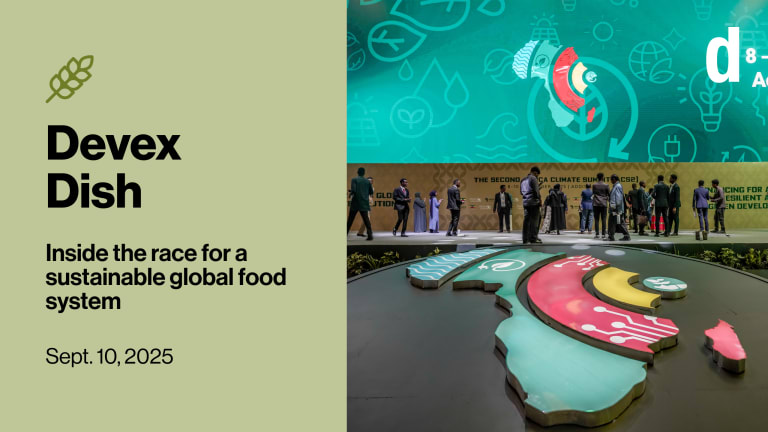David Lane, president and chief executive officer of advocacy group ONE, knows what he’s looking for in next week’s Millennium Development Goals summit – concrete action, and commitment from both state and nonstate actors.
Heads of state will convene in New York Sept. 20-22 to assess current conditions and progress made on the achievement of the eight goals.
“If New York is full of great speeches, if the [United Nations MDG] declaration is full of great rhetoric and there aren’t no concrete steps, we should all be disappointed,” Lane said in the U.S. State Department’s “Conversations with America” on Sept. 16, where U.S. Agency for International Development Administrator Rajiv Shah also appeared as a guest.
Lane said the Global Fund to Fight AIDS, Tuberculosis and Malaria’s replenishment in early October will be a test on the success of next week’s summit.
“If in fact after a great rhetoric in New York, we have a disappointing replenishment conference, that would tell us we’re not doing all the things we need to do to meet these goals,” Lane said.
Just as important as mobilizing resources, Shah said, is ensuring that aid money yields outcomes. He said the U.S. government will unveil a website that monitors the flow of U.S. foreign aid in terms of aid-recipient nations and sector priorities.
The release of the Presidential Study Directive and Quadrennial Diplomacy and Development Review will also bring more clarity and accountability in foreign aid spending, Shah said.
While the U.S. government has already unveiled its own MDG plan, Lane said U.S. President Obama has yet to fulfill his pledge - in an address to the U.N. General Assembly last year - of approaching next week’s summit with “a global plan” to help turn the MDGs into a reality.
Country Ownership
Another key thing to watch out for in next week’s MDG summit is the promotion of country-ownership of development stratgies, Lane said.
He called for a shift in the leadership of aid programs to local governments and civil society, adding that development initiatives should be responsive to country-owned plans.
The U.S., Shah said, has been working to develop local capacity of aid-recipient nations. He said his nation has implemented a “tough but important” package of procurement reforms to get resources to local entrepreneurs to help them build their capacities.
“Our current [procurement] mechanisms that often lean on U.S.-based contractors and firms may not always be the best way to get resources to local entrepreneurs,” Shah said.
Governance, Climate Change
Shah said problems in realizing the MDGs are related to good governance and women’s empowerment, which are further complicated by the adverse impacts of climate change and financial crisis.
Climate change sets backs nations that are otherwise on the road to progress, Shah said, underscoring the need for more resilient agricultural systems and social insurance.
Meanwhile, a focus on governance and a vibrant civil society will help foster development, Lane said. He added that governments should not look to foreign aid as the answer to their problems, and the civil society should demand more from their governments.








